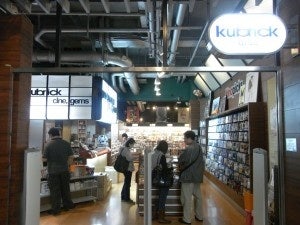Beijing Currently Has Three Art House Theaters#

"Devoted but frustrated" -- that's how one Chinese newspaper recently referred to Beijing's beleaguered independent film fans. Though the Chinese capital now has three art-house theaters -- a modest count for a city of over 20 million -- a dearth of available films, a lack of management talent and poor return on investment for owners means the future of China's independent theaters has been most often cast as murky. But despite the challenges, some theater owners remain optimistic. As Wu Jing, content manager of Beijing's Broadway Cinematheque MOMA (BC MOMA), said of the scene, "It's better than people think...Of course we don't make much money [from the theater], but it's not so hard."
Beijing's three art-house theaters -- BC MOMA, the China Film Archive (CFA) and Ullens Center for Contemporary Art (UCCA) -- each have distinguishing features. Converted from a lecture hall in 2009, UCCA's art theater, one of only a handful in China currently supporting domestic independent film, also offers lectures and discussions between directors and audiences. Despite its small size -- the UCCA theater has only one projection room that holds 139 people -- UCCA is a popular venue among directors, producers and special invited guests. State-owned CFA, which opened in 1996, is more academic than artsy, generally showing older Chinese and international films from its 30,000-strong archive. Opened in 2009, BC MOMA is widely considered the most international of the three, screening popular films from overseas as well as domestic indie films that would otherwise struggle to find an audience.
Die-hard movie lovers and film students continue to head to BC MOMA, CFA and UCCA on a regular basis, but some worry that broader indifference among the Beijing movie-going audience, the popularity of online video, and the difficulty in procuring quality films will keep the Chinese capital woefully underserved by independent film in the years ahead. As Wu Jing of BC MOMA told the Global Times this week, "We are not short of quality audiences, but good art films." Before the Beijing art-house theater scene can further develop, then, fundamental questions about sourcing films need to be answered before simply constructing more theaters. This goes part of the way to explaining why a city the size of Beijing has only three such venues while, as Cui Qiao put it, "Berlin has over 100 different art theaters for a population of 4 million."

There are indications that the industry could be on the cusp of some major changes, however. This March, respected director Jia Zhangke (Jing Daily interview) posted on his Sina Weibo that he plans to build a 100-seat single-hall art-house theater. Following his announcement, other filmmakers active on Weibo reacted excitedly, with Wang Xiaoshuai writing, “Mr. Jia is awesome! I’ve been thinking about doing something like this for such a long time but failed to implement such a vision.” Another Weibo user commented that Jia’s involvement in the independent theater business would be a “breakthrough” for arthouse film in China.
Elsewhere, the likes of Hong Kong's Broadway Cinematheque -- which includes not only a theater but also coffeehouse, bookstore and video store -- could provide a business model to help Mainland venues supplement their revenue streams and better their chances of survival. If more box-office heavyweights throw their weight behind the industry, and existing art-house theaters figure out how to get their financial situations in order, we might see China's independent film scene finally start to live up to its potential.
